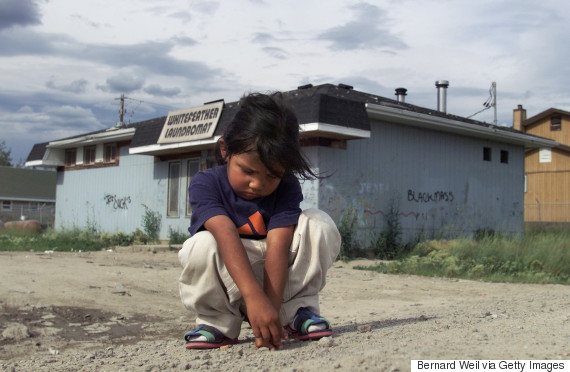Nine dead in family house fire at remote Canadian indigenous community
Source: Guardian, Reuters and the AP
Nine dead in family house fire at remote Canadian indigenous community
Staff and agencies in Pikangikum
Wednesday 30 March 2016 16.54 EDT
Nine people from one family have died in a house fire on a remote aboriginal reserve in Canada’s northern Ontario region, according to media reports on Wednesday.
Robert Nault, the member of parliament for the area that includes Pikangikum First Nation, said the dead include three children. The reserve has been in the news for a high number of suicides among young people and social problems.
Constable Diana Cole of Ontario provincial police said the fire broke out late on Tuesday night in the remote community near the Manitoba-Ontario border.
. . .
“Our communities are overwhelmed with suicide at an epidemic level, a health crisis and several states of emergency. These fire-related fatalities are stretching their limited resources to the breaking point,” Fiddler said in a statement later.
Read more: http://www.theguardian.com/world/2016/mar/30/canada-first-nation-house-fire-nine-dead-indigenous
Judi Lynn
(160,527 posts)Pikangikum First Nation
From Wikipedia, the free encyclopedia
The Pikangikum First Nation (Ojibwe: pointed: ᐱᑳᐣᒋᑲᒦᐣᐠ ᐯᒫᑎᓯᐚᐨ; unpointed: ᐱᑲᒋᑲᒥᑭ ᐯᒪᑎᓯᐘᒋ; Bigaanjigamiing Bemaadiziwaaj; locally: Beekahncheekahmeeng Paymahteeseewahch) is an Ojibwe First Nation[2] located on the 1,808-hectare (4,470-acre) Pikangikum 14 Reserve,[3] in Unorganized Kenora District in Northwestern Ontario, Canada.[4] The main centre is the community of Pikangikum,[5] on Pikangikum Lake on the Berens River, part of the Hudson Bay drainage system; it is approximately 100 kilometres (60 mi) north of the town of Red Lake.
The community has a registered population as of September 2011 of 2,443, of whom 2,334 live on the reserve.
Society[edit]
A 2005 Wawatay Native Communications Society survey found that the residents of Pikangikum have one of the highest rates of original language retention of any First Nation in Northern Ontario. The language is Ojibwemowin, the major dialect of Anishinaabe peoples (see Berens River Ojibwe language). In 2000, the First Nation was reported to have the highest suicide rate in the world.[7] A report by the Office of the Chief Coroner of Ontario released June 1, 2011 regarding 16 deaths by suicide between 2006 and 2008 on the reserve showed a pattern of inhalant abuse by young women aggravated by poor educational, health, child welfare, and other services.[8]
Clans[edit]
The community has the following doodem (clans):
caribou (adik)
sturgeon (nuhmay)
pelican (zhashagi)
Government[edit]
The Pikangikum First Nation is governed by a council elected via a custom electoral system consisting of a chief, deputy chief and nine councillors/ The current chief is Dean Owen and deputy chief is Jonah Strang.[9] Pikangikum First Nation is a member of Treaty 5 (through the initial signing on 20 September 1875 at Berens River, Manitoba) and the Independent First Nations Alliance.
Transportation[edit]
The community is accessible primarily by airplane at the Pikangikum Airport, although it is also served by Pikangikum Water Aerodrome. It has winter road access north to Poplar Hill First Nation and south to Red Lake and Ontario Highway 125.
Economy[edit]
Unemployment rates are estimated to be around 90% in Pikangikum.[10
More:
https://en.wikipedia.org/wiki/Pikangikum_First_Nation
[center]
 [/center]
[/center]
Doug Keshen: The Canadian community electricity forgot
Doug Keshen, National Post | February 12, 2016 6:37 PM ET
More from National Post

The Pikangikum First Nation is a remote fly-in community north of Red Lake, Ont. There are approximately 3,000 on-reserve residents who entirely rely upon diesel generation for electricity (the electricity grid does not reach the community). Last week, it was -42 C with the windchill, which is not at all unusual at this time of year.
I am not trying to blame anyone in particular for the fact that the community has not been hooked up to the electrical grid. I am certain Pikangikum’s previous MPs promoted the need for a grid, but for whatever reasons, the bureaucracy has denied it from proceeding. And I am sure the recently elected MP for the riding also supports the idea, but he is dealing with the same bureaucrats from Indigenous and Northern Affairs Canada (INAC) and, for whatever reasons, it is just not happening.
(For purposes of full disclosure, I was formerly the legal counsel for Pikangikum First Nation. I am not presently associated with Pikangikum, nor have I been for the past few years; nor do I have direction or authorization from the present chief and council to address any issue, including this egregious matter of the continued absence of hydro power to their community. I do so only as a concerned citizen and someone who has considerable knowledge of the community, where I continue to have many friends. With my past knowledge and familiarity with the community, to remain silent was not an option.)
What the public needs to know is that the power lines were committed to be built as far back as 1998 — some 18 years ago. Why it has not happened is a matter of historical record, which is a classic “he-said-she said” scenario. Yet this is agonizingly irrelevant, most certainly so for the people of Pikangikum, the only ones whose daily lives continue to be impacted.
http://news.nationalpost.com/full-comment/doug-keshen-the-canadian-community-electricity-forgot